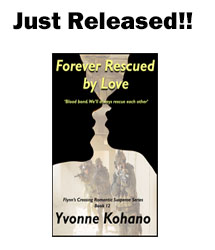Using Sounds to Tell Your Story
06-13-13
As a writer, I spend a lot of time listening. I listen for accents, dialects, and speech patterns. I listen to sagas of woe and tales of joy. I listen with story ideas, scene concepts, and plot arcs settling in my memory.
More than this, though, I listen to the non-human world around me.
There’s a fiction writer’s adage that you need to write with all of your senses so that your readers can relate to your story with all of theirs. Sound offers rich and diverse material to provide a sense of place, but it also draws great comparisons that, as a writer, you can use to give people a clue about a character’s emotions or a plot’s conflict or arc.
Here’s an example:
“Startling in its power, the crash high up on the mountain reverberated like a thousand drums, echoing down the canyon and back up its granite face.”
Who hasn’t heard a drum? A thousand of them sets the stage for lots of noise. In this case, what does it mean to the character hearing the noise? Joyous, scared, angry? What’s the crash? A bomb exploding? A shotgun blast?
Here, it’s thunder. A drum can sound like thunder too. Sound is like that – reciprocal and enlightening, emphasizing characteristics and giving volume – if you’ll pardon the pun – to a sense.
How can you learn to use or interpret descriptions of sound more effectively? You listen. The cry of a bird can sound like a scream of a child. The cry of a mountain lion sounds like a scream too – of a grown woman. Rustling leaves remind us of flipping pages in a book. The roar of pine needles shuddering in a strong wind is similar to an oncoming train. Think of the many ways that people have described the approach of a tornado and its howl. If you’re a writer, you want to build more of these clues into your writing, and as a reader, you want to have a sensation come to mind when you read those words.
On your current work in progress or in something you’re now reading, look for descriptions or comparisons of sound. In your own work, are there places in your story where a sound could enhance the experience of your readers? What are some of your favorite descriptors of sound in something you’ve read? I’d love to hear (okay, pun intended!) some great examples.

2 Comments
Nadezhda Seiler
June 14, 2013Yvonne, thank you for your wonderful article and insight. It’ll help me in writing a scene that takes place in the forest in winter time. Lots of snow! Very cold. Not many sounds at night, unless I listen carefully 🙂
Regards,
Nadya
Yvonne Kochanowski
June 14, 2013Thanks Nadya! You have a great opportunity to use lots of sounds here – from nature to how the characters experience that frigid weather. Let me know how it turns out! Happy writing! Yvonne